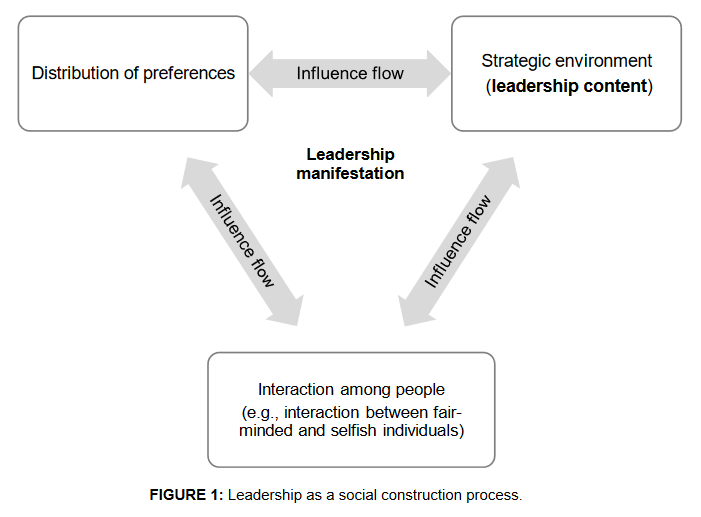ABSTRACT
What is the optimal motivational system resulting from the interaction dynamics among heterogeneous individuals? This conceptual article wishes to convey practical relevance to the Relational Social Constructionist view of Leadership (RSCL) by emph…
See full abstracts, authors, references, citations & other publication information.
+
…asizing the role of the manager’s strategic choice in handling the conditioning exerted by the personal dimension in leadership processes. Acknowledging the relevance of the personal constructs as an essential situational factor from which the leader-follower relationship arises, the article points out that the optimal incentive system is not independent of the interaction mechanisms between selfinterested and inequity-averse individuals. At the same time, it also shows that the strategic environment evoked by the incentive systems, in turn, is able to affect individual preferences and their interaction. The underlying purpose is to assess how reciprocal fairness is able to affect the context dynamics in which, according to RSCL, leadership processes are embedded and occur. Therefore, this contribution is intended for all scholars and practitioners who require to understand what the theoretical and practical value of including the influence flows emerging from social construction processes actually is. In particular, by taking a view that aims to increase awareness about the effect of social preferences in relationship dynamics, the presented findings may have the potential to widen the meaning of management theory and practice.
Full Text/Reference Website: https://www.cscjournals.org/library/manuscriptinfo.php?mc=IJBRM-358

AUTHORS
Miss Anastassia Zannoni – Department of Management and Law, University of Rome “Tor Vergata”, Rome, 00133 – Italy
KEYWORDS
Relational Social Constructionist Leadership, Heterogeneous Preferences, Reciprocal Fairness, Incentive Systems, Strategic Interaction.
Indexing Keywords: The Contribution of Social Preferences to Relational Social Constructionist Leadership: Reciprocal Fairness and Incentive Systems, The Contribution of Social Preferences to Relational Social Constructionist Leadership, Social Preferences to Relational Social Constructionist Leadership, Reciprocal Fairness and Incentive Systems, Incentive Systems, Relational Social Constructionist Leadership: Reciprocal Fairness and Incentive Systems.
Pages: 1-27
Revised: 28-02-2023
Published: 01-04-2023Published in International Journal of Business Research Management (IJBRM).
Volume: 14
Issue: 1
Publication Date: 01-04-2023
*Randomly selected references used in the publication “The Contribution of Social Preferences to Relational Social Constructionist Leadership: Reciprocal Fairness and Incentive Systems”.
- Abatecola, G. (2014). “Research in Organizational Evolution. What Comes Next?”. European Management Journal, 32(3), pp. 434-443.
- Barker, J.R. (1993). “Tightening the Iron Cage: Concertive Control in Self-Managing Teams”. Administrative Science Quarterly, (38)3, pp. 408-437.
- Smith, A. (1759). The Theory of Moral Sentiments. Liberty Fund, Indianapolis, 1982.
- Stodgill, R.M. (1950). “Leadership, Membership and Organization”. Psychological Bulletin, (47)1, pp.1-14.
- Tannenbaum, R., and Schmidt, W.H. (1958). “How to Choose a Leadership Pattern”. Harvard Business Review, (36)2, pp. 95-101.
- Thaler, R.H. (2015).Misbehaving: The Making of Behavioral Economics. W.W. Northon & Co, New York.
- Uhl-Bien, M. (2006). “Relational Leadership Theory: Exploring the Social Processes of Leadership and Organizing”. Leadership Quarterly, (17)6, pp. 654-676.
- Vaara, E., and Whittington, R. (2012). “Strategy-as-Practice: Taking Social Practices Seriously”. Academy of Management Annals, 6(1), pp. 285-336.
- Van Maanen, J. (1979). “The Fact of Fiction in Organizational Ethnography”. Administrative Science Quarterly, (24)4, pp. 539-550.
- Wang, D., Waldman, D.A., and Zhang, Z. (2014). “A Meta-Analysis of Shared Leadership and Team Effectiveness”. Journal of Applied Psychology, (99)2, pp. 181-198.
CITATIONS
Citations used in the publication “The Contribution of Social Preferences to Relational Social Constructionist Leadership: Reciprocal Fairness and Incentive Systems”.
Currently there are no citations collected for this publication at scholarlyabstracts.com.
-
CONTACT US
Please feel free to us at scholarlyabstracts@gmail.com if you wish to:
- Get your journal, conference or thesis, registered with us.
- Update this publication content.
